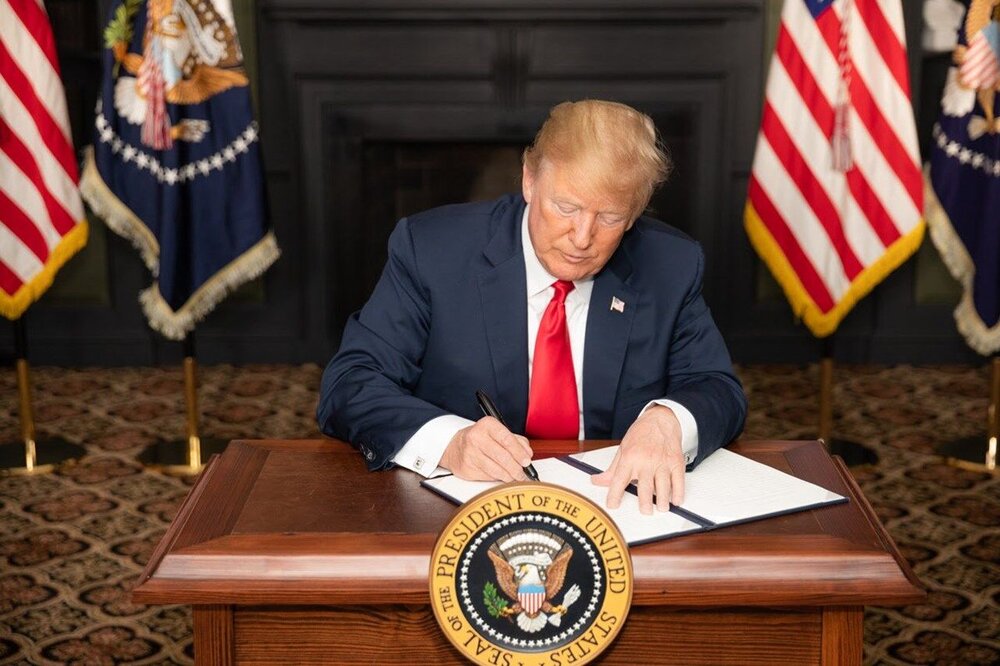Trump extends state of emergency with Iran

TEHRAN – U.S. President Donald Trump notified Congress on Thursday that he was extending the state of national emergency with Iran that has been in place since 1979.
“Our relations with Iran have not yet normalized, and the process of implementing the agreements with Iran, dated January 19, 1981, is ongoing. For this reason, the national emergency declared on November 14, 1979, and the measures adopted on that date to deal with that emergency, must continue in effect beyond November 14, 2020,” Trump wrote in a letter to Congress.
“Therefore, in accordance with section 202(d) of the National Emergencies Act (50 U.S.C. 1622(d)), I am continuing for 1 year the national emergency with respect to Iran declared in Executive Order 12170,” he added.
A state of emergency gives a U.S. president extraordinary powers, including the ability to seize property, summon the National Guard and hire and fire military officers at will.
The state of emergency also forms the basis for most U.S. sanctions against other countries.
Tensions soared between Tehran and Washington after the Trump administration unilaterally walked away from the 2015 nuclear deal, officially called the Joint Comprehensive Plan of Action (JCPOA), in May 2018.
Under the JCPOA, which was also signed by Russia, China, France, the United Kingdom, Germany and the European Union, Iran agreed to curb its nuclear program in exchange for termination of economic and financial sanctions.
Trump’s withdrawal came while Iran was in full compliance with the treaty. He then reimplemented stringent sanctions against Iran. All other parties to the deal have repeatedly criticized the Trump administration’s policy toward Iran.
Ever since Trump’s defeat was projected by the U.S. media, the lame-duck president’s administration has accelerated its efforts to slap more sanctions on Iran in order to create more obstacles in the path of Washington’s return to the nuclear agreement.
On Tuesday, the U.S. government imposed Iran-related sanctions on six companies and four people, accusing the network of supplying sensitive goods to an Iranian military firm.
In a statement, the U.S. Treasury Department accused the companies and individuals of facilitating the procurement of sensitive goods, including U.S.-origin electronic components, for Iran Communication Industries, an Iranian military firm blacklisted by Washington and the European Union.
“The Iranian regime utilizes a global network of companies to advance its destabilizing military capabilities,” Treasury Secretary Steven Mnuchin said in the statement.
“The United States will continue to take action against those who help to support the regime’s militarization and proliferation efforts,” he added.
Pompeo terms U.S. return to JCPOA as ‘crazy idea’
On Thursday, U.S. Secretary of State Mike Pompeo said a possible Washington’s reentry to the 2015 nuclear deal under the incoming Biden administration a “crazy idea”.
“This is – it’s a crazy idea to think that you’re going to get back into a deal that permitted a clean pathway for the Iranians to have a nuclear weapon by which they could terrorize the entire world,” Pompeo said on The Hugh Hewitt Show.
Pompeo said it was not right to normalize with Iran. “Today, they continue to build out their missile program, to extend their capacity to wreak terror across the world,” claimed Pompeo whom Iranian Foreign Minister called “secretary of hate”.
Pompeo further accused Iran of behaving in ways that are inconsistent with the commitments “even that they made under the JCPOA itself, as crazy as that was. This is a theocracy, a kleptocracy.”
MH/PA
Leave a Comment